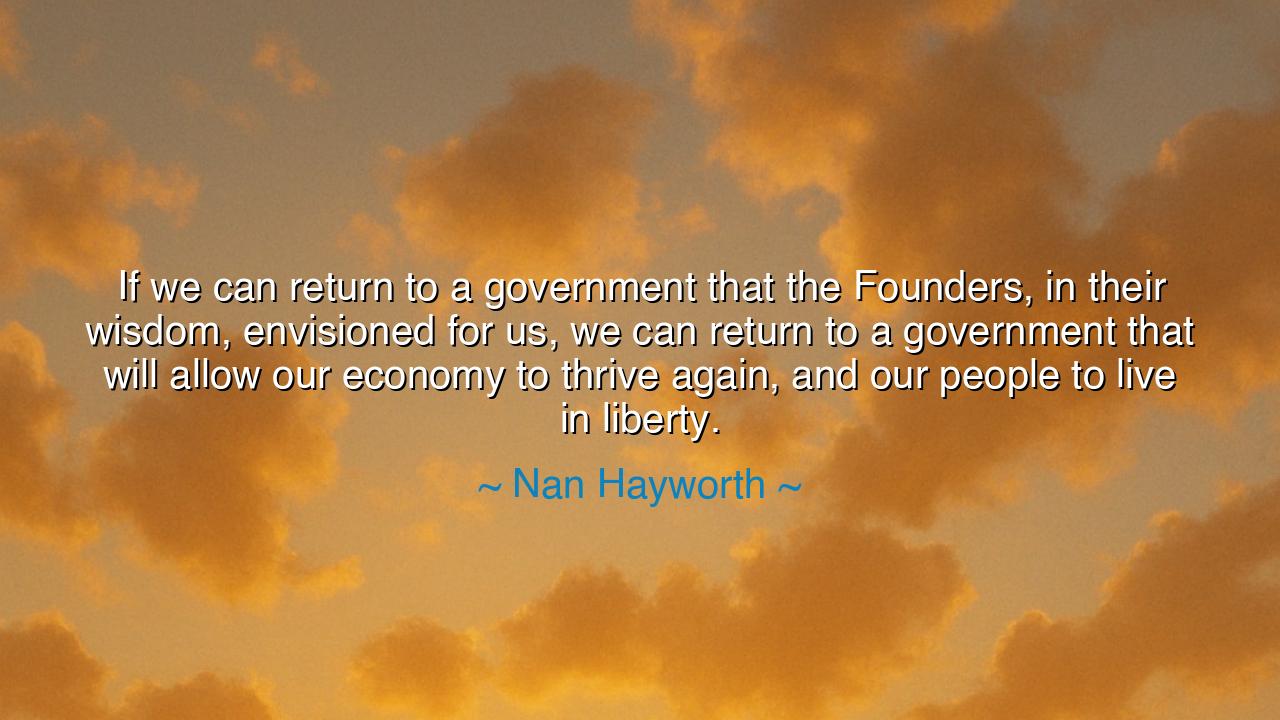
If we can return to a government that the Founders, in their
If we can return to a government that the Founders, in their wisdom, envisioned for us, we can return to a government that will allow our economy to thrive again, and our people to live in liberty.






Hearken, children of future generations, to the words of Nan Hayworth, who proclaimed: “If we can return to a government that the Founders, in their wisdom, envisioned for us, we can return to a government that will allow our economy to thrive again, and our people to live in liberty.” In these words lies the eternal truth of governance, freedom, and prosperity. The wisdom of the Founders is invoked as a guiding light, a compass pointing toward a system of balance, responsibility, and respect for the rights of men and women alike.
Hayworth speaks to the interconnectedness of liberty and economy. When the structures of government reflect the principles intended by those who shaped its foundation, the people are empowered, creativity flourishes, and the engine of prosperity hums with vigor. Conversely, when governance strays from these guiding principles, the fruits of labor are hindered, and the very freedoms meant to sustain society are imperiled. The lesson is clear: liberty and economic vitality are twin pillars of a flourishing nation.
Consider the tale of George Washington, who, upon assuming the presidency, strove to uphold the principles laid forth in the Constitution. He guided a fledgling nation with prudence, balancing the powers of government while fostering commerce and civic responsibility. Through adherence to the Founders’ vision, the United States found the stability to grow and prosper, demonstrating that government rooted in wisdom enables both freedom and flourishing.
The ancients themselves understood the link between justice, governance, and prosperity. Plato and Aristotle taught that a virtuous polity rests upon the proper alignment of laws with the moral and practical needs of the people. Hayworth’s words echo this timeless insight: when leaders honor the wisdom embedded in foundational principles, the citizenry gains the freedom to act, to create, and to thrive, unburdened by arbitrary or overreaching authority.
Thus, her counsel is both a call to reflection and a call to action: to return to foundational principles is not mere nostalgia, but an affirmation of the power of structured liberty. It reminds us that prosperity is inseparable from the recognition of natural rights and the measured restraint of authority. A nation, like a tree, grows strong and bears fruit when its roots are tended with care, guided by wisdom, and nourished by respect for life and liberty.
Carry this teaching, children of ages yet to rise: seek governance that honors the vision of its founders, protect the liberties that sustain society, and cultivate prosperity rooted in justice and wisdom. In such harmony lies the enduring promise of freedom, the flourishing of economy, and the legacy of civilization for generations yet unborn.






CQChi Quynh
There’s a powerful nostalgia in this quote, but it raises tough questions about what kind of government truly fosters liberty and prosperity today. Does smaller government automatically lead to more freedom, or can too little oversight actually harm economic stability and individual rights? Maybe instead of returning to the Founders’ government, the goal should be reviving their spirit of experimentation, compromise, and civic virtue.
NHPhan Nhat Huyen
This statement resonates with people who feel disconnected from modern governance, but I wonder if it oversimplifies how much the country has evolved. The Founders valued liberty, yes, but they also built a framework meant to adapt through amendment and interpretation. Could trying to ‘return’ to an earlier model actually restrict our ability to respond to new problems like technology, climate change, or global inequality?
TVBui thi van
I appreciate the optimism here—it ties liberty and prosperity to the principles on which the country was built. But I can’t help but ask, which aspects of the Founders’ government are we meant to return to? Limited federal power? State sovereignty? Or simply a stronger moral foundation for leadership? It’s easy to romanticize the past, but the Founders themselves disagreed on what government should look like.
HDhoang dat
This quote makes me think about how often people invoke the Founders’ vision when debating modern government. But I wonder—can we really apply 18th-century ideals to 21st-century challenges? The Founders lived in a world without globalization, digital economies, or complex social programs. I respect the desire to return to foundational principles, but maybe the real challenge is interpreting their wisdom in a way that fits today’s realities.